Which Cheap Synology NAS should you Buy? DS119j, DS218j or DS418j
For those who are looking at buying their very first NAS drive, or are just looking for a simple network backup to support their existing NAS server, it can be a bit confusing. Synology has made efforts to separate their range of NAS server drives into different categories, in an effort to distinguish which one is most suitable for different applications. Very early on it becomes clear that the Synology J series is the most cost-effective range of devices in their portfolio, however, they have a very similar price and aside from a number of Hard Drive bays, it can be very hard to choose the best budget NAS in 2019. So, we have decided to compare the Synology DS119J 1-Bay, the Synology DS218J 2-Bay and the oldest of the three, the Synology DS418J NAS.
Synology DS119j vs DS218j vs DS418j – Value for Money
Because you want to buy a budget/cost effective NAS solution, it will be a big consideration for how much it will cost. Although these three NAS drives are by far the lowest priced Synology NAS devices you can buy in their respective ranges, when compared against each other, the price tag differences are pretty big. In fact, in the jump from 1-bay, to 2-bay and finally to 3-Bay, the price almost doubles each time! The Reason for this is threefold.
- The number of hard drive bays inside requires a better CPU each time to handle the RAID and communication of users to the larger media
- A bigger power supplier is needed each time to support these drives
- A bigger chassis is required to house the drives, as well as improved methods of cooling/ventilation to ensure maximum operational temperatures
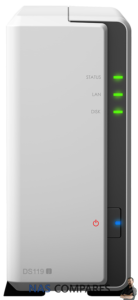 |
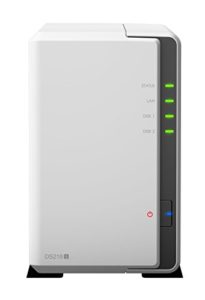 |
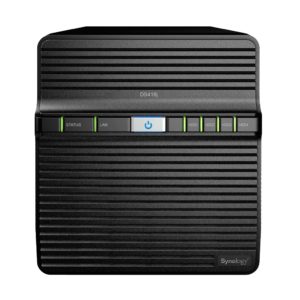 |
|
| Synology DS119J NAS
|
Synology DS218J NAS
|
Synology DS418J NAS
|
|
| 1-Bay – £95+ | 2-Bay – £150+ | 4-Bay – £280+ |
Most users on a tight budget will want to appropriately divide their budget between NAS hardware and NAS Hard Drive storage (which need to be purchased separately). NAS Hard drives are roughly £30-35 per Terabyte (using Seagate Ironwolf NAS drives as an example), so you will need to factor this in. Although the DS119J is just £90+, it can only hold 1 hard drive, so you will either need to spend more on a bigger HDD (lose any RAID support too) or limit your long-term storage. Alternatively, you can buy the DS218J at £150+ and either spread the cost of storage across two HDD bays or just populate the NAS with 1 hard drive at the start and add another later.
Which leads me to recommend highly that you buy the Synology DS418J NAS as the best NAS for value for money. Although it is by far the most expensive NAS at £280+, you have the option of 4 hard drives and SIGNIFICANTLY better hardware inside that the others (will discuss more below). The clincher is simply the fact you can add hard drives over time, starting with a small drive to start and add bigger and better drives as you need over time. The DS218j and DS119j NAS both require you to add BIG hard drives at the start in order to ensure long-term storage and this ends up costing you more in the long run.
WINNER – Synology DS418J NAS
You just get alot more for your money. Also, it lets you leverage the cost of HDD and NAS Hardware much better overall.
Synology DS119j vs DS218j vs DS418j – Design
Despite the fact that all three Synology NAS is budget in price, all three have adopted the Synology style very well indeed. NAS drives are designed to be left on for days, weeks and months at a time, so both passive and active cooling is very important. All NAS feature multiple panels of ventilation and an active rear cooling fan, however, although the DS119j and DS218j are very similar (using a near identical white plastic chassis, non hot-swap drives and a single plastic rear fan), the DS418j is a very different device indeed in terms of design. All three feature dual USB ports (with USB 2.0 on the DS119j) and all three NAS feature the ventilated Synology logo.
Straight away, the DS119j and DS218j NAS are the more discreet of the two NAS, with the 1-Bay and 2-Bay being just under 3cm (29mm in fact) different in width. Both use a plastic chassis which lowers operational noise considerably and both are very discreet in terms of size. They even have very similar power consumption, despite their difference in price/size which is always a consideration for heat generation and long-term running. The DS418j, on the other hand, is much bigger in every direction, features a rather dated looking chassis (looks like a 70s cooking appliance but in black) and is a combination of metal and plastic. As much as I want to praise them for the design quality, there is no escaping that the DS418j is the least attractive of the three, is bigger, noisier and generates more heat (even despite those twin rear fans).
WINNER – The Synology DS218j NAS
Although it is very similar to the DS119j, it seems to do a much better job of making the most of that chassis design and makes subtle improvements over the smaller NAS.
Synology DS119j vs DS218j vs DS418j – Hardware
In terms of hardware, the DS119j, DS218j and DS418j have taken very different paths. We discussed the outside chassis etc earlier, but (like many things) it is what inside that counts! With each price/bay jump between them, the internal CPU power, memory storage and efficiency effectively doubles with each tier. See below:
 |
 |
 |
|
| Synology DS119J NAS | Synology DS218J NAS | Synology DS418J NAS | |
| 1-Bay – £95+ | 2-Bay – £150+ | 4-Bay – £280+ |
The CPU on the Synology DS119j is painfully low powered. Do not be fooled by the fact it is a dual core, it is painfully low powered and even as a network backup drive, it still registers very low speeds indeed. In fact, all three NAS are dual core in design and the DS218j and DS418j are very similar in clock speed (1.3Ghz and 1.4Ghz). However, the big, BIG thing to remember is the fact the DS218j uses a 32bit architecture CPU and the DS418j uses a 64bit architecture CPU. The difference here is very, very important, as more applications will be able to run on a 64bit processor, as well as it running smoother overall thanks to it’s improved floating point. This point is further enforced by the better memory present in the DS418j, compared with the other two. There is twice as much RAM in the DS418j than the DS218j, as well as 4x of the DS119j. But once again, it is quality that is important here – the DS418j uses faster DDR4 memory, whereas the DS119j and DS218j use DDR3.
WINNER – Synology DS418J NAS
It is very hard to ignore the faster, more efficient and capable CPU on the DS418j NAS, as well as the higher quantity and quality memory included with this NAS.
Synology DS119j vs DS218j vs DS418j- Software
As you would expect, given the superior hardware featured on the Synology DS418j, it has a much bigger coverage of NAS software in the Synology DiskStation Manager software than the DS119j and DS218j. However, though the DS418j is leaps ahead of the Synology DS119j NAS, it is only fractionally better in terms of software than the DS218J. The key advantages are only those where the additional two bays of storage play their part. Below are the key/popular software specs for the three NAS and how they compare:
| Buy Below | Buy Below | Buy Below | |
 |
 |
 |
|
| Synology DS119J NAS | Synology DS218J NAS | Synology DS418J NAS | |
| 1-Bay – £95+ | 2-Bay – £150+ | 4-Bay – £280+ |
This site is supported by ad revenue. Just by clicking the buy buttons above, you support this site to keep more users informed on the wonderful world of NAS. Thank you.
🔒 Join Inner Circle
Get an alert every time something gets added to this specific article!
This description contains links to Amazon. These links will take you to some of the products mentioned in today's content. As an Amazon Associate, I earn from qualifying purchases. Visit the NASCompares Deal Finder to find the best place to buy this device in your region, based on Service, Support and Reputation - Just Search for your NAS Drive in the Box Below
Need Advice on Data Storage from an Expert?
Finally, for free advice about your setup, just leave a message in the comments below here at NASCompares.com and we will get back to you. Need Help?
Where possible (and where appropriate) please provide as much information about your requirements, as then I can arrange the best answer and solution to your needs. Do not worry about your e-mail address being required, it will NOT be used in a mailing list and will NOT be used in any way other than to respond to your enquiry.
Need Help?
Where possible (and where appropriate) please provide as much information about your requirements, as then I can arrange the best answer and solution to your needs. Do not worry about your e-mail address being required, it will NOT be used in a mailing list and will NOT be used in any way other than to respond to your enquiry.

|
 |
UGREEN NAS Now has iSCSI, 2FA and Jellyfin (and more) - FINALLY!
Seagate 30TB Ironwolf and EXOS Hard Drive Review
Why Do Cheap NAS Boxes EXIST????
Minisforum N5 Pro NAS - Should You Buy?
UGREEN DH4300 & DH2300 NAS Revealed - Good Value?
Aoostar WTR Max NAS - Should You Buy?
Access content via Patreon or KO-FI


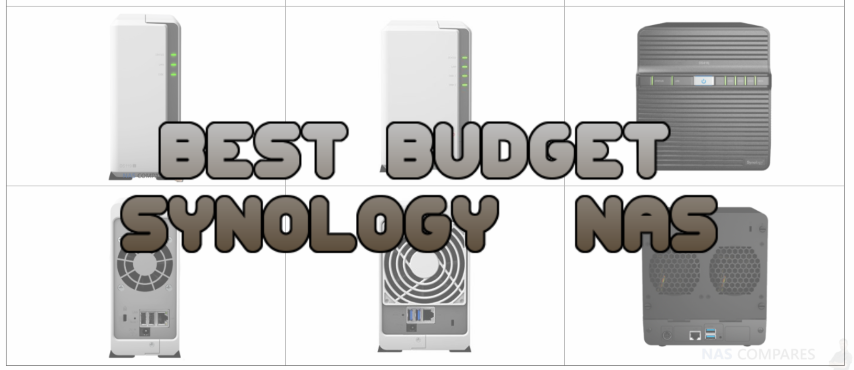
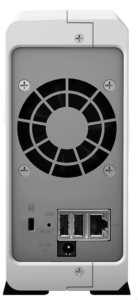
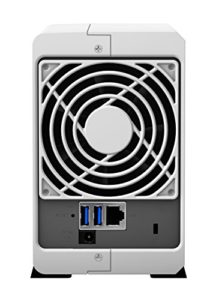
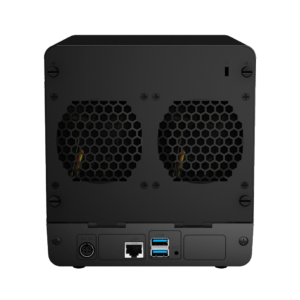




DISCUSS with others your opinion about this subject.
ASK questions to NAS community
SHARE more details what you have found on this subject
CONTRIBUTE with your own article or review. Click HERE
IMPROVE this niche ecosystem, let us know what to change/fix on this site
EARN KO-FI Share your knowledge with others and get paid for it! Click HERE